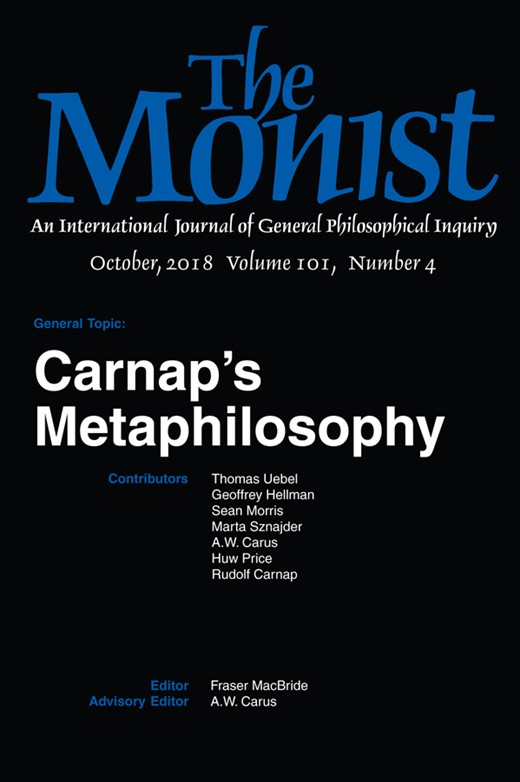-
Views
-
Cite
Cite
A W Carus, Introduction, The Monist, Volume 101, Issue 4, October 2018, Pages 363–366, https://doi.org/10.1093/monist/ony011
Close - Share Icon Share
Extract
This issue of The Monist on Carnap’s metaphilosophy is another clear demonstration that Carnap’s career, nearly half a century after his death, is far from over. The scope of Carnap studies continues to broaden into new fields, incorporating more aspects of his thought and bringing it to bear on more aspects of philosophy. And more of his previously unpublished and unknown writings continue to appear; this is the third special issue of a journal in the past year or so that includes hitherto unpublished texts by Carnap himself.1 I am also pleased that this issue of The Monist extends from the very early Carnap (one of the texts newly published here dates to 1911, when he was only 20) to the very late Carnap (Marta Sznajder’s paper on his inductive logic includes discussion of the posthumous papers from 1971 and 1978).2
The call for papers was partly inspired by the recent burst of interest in metametaphysics, which in its present form3 derives from the debate between Carnap and Quine about ontology during the 1950s. While the Carnap-Quine debate itself is well represented here in the papers by Geoffrey Hellman and Sean Morris, the metametaphysical discussion about that debate is itself largely absent, to my surprise. That was not the intent, though Carnap himself would presumably have been pleased. He would also have been grateful for Thomas Uebel’s paper explaining that his apparent “elimination” of epistemology during the 1930s did not mean that epistemological questions had been ruled out, only that they had been largely turned into practical questions rather than cognitive ones—but practical questions whose answers needed to be informed by a lot of empirical knowledge. Along similar lines, my own paper tries to make clear, using Huw Price’s “global expressivism” as an example and starting point, what a Carnapian “descriptive pragmatics” would actually involve. In his reply, Price acknowledges Carnap as a fellow traveler and leaves room for descriptive pragmatics but also sketches some limits to this endorsement.



